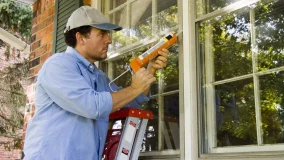How Homeowners Insurance Can Help with Seasonal Home Improvements
Many homeowners tackle seasonal home improvements projects to get their home in order before the summer heat sets in or the colder weather arrives. While these tasks may seem daunting, they can often be completed with just a few simple steps.
One important thing to keep in mind when undertaking any kind of home improvement project is homeowners insurance. Having a policy in place could help protect you from financial liabilities in the event that something goes wrong. For example, if you accidentally damage your neighbor’s property while working on your own home, your homeowners insurance policy may help cover the cost of repairs.
In addition to providing protection in the event of an accident, homeowners insurance could also help if your project requires a permit. For instance, if you are adding a porch to your home and need to obtain a permit from your local government, your homeowners insurance policy may help cover the costs of any fines that are assessed.
It is important to check with your insurance company to verify you are covered for the specific types of home improvements that you are planning to do. If you’re not, it may be worth considering purchasing additional coverage. By taking the time to review your homeowners insurance policy and make sure that you are properly covered, you may rest assured that your seasonal home improvement project will go as smoothly as possible.
Maintenance Checklist for Seasonal Home Improvements
Homeowners should perform some basic maintenance tasks every season to help protect their homes and avoid costly repairs down the road. Below is a checklist of recommended tasks to complete in the spring, summer, fall, and winter.
In the spring:
- Check your homeowners insurance policy to make sure you are fully covered in case of a natural disaster or other emergency.
- Clean or replace your air conditioning filter to ensure efficient operation.
- Inspect your roof for any damage from winter weather and make repairs as necessary.
- Clean your gutters and downspouts to prevent flooding and water damage.
- Trim trees and shrubs around your home to prevent them from damaging your property.
- Inspect for cracks or other damage to your home’s foundation and repair as necessary.
In the summer:
- Check your windows and doors for any leaks and seal them up if necessary.
- Install an energy-saving thermostat to help save money and energy on your cooling costs.
- Inspect your home’s exterior for any signs of termite damage and call an exterminator if necessary. • Inspect for cracks or other damage to your home’s foundation and repair as necessary.
In the fall:
- Reverse the direction of your ceiling fans to help circulate warm air in your home.
- Clean and check your chimney for damage or buildup and have it cleaned if necessary.
- Install a carbon monoxide detector to protect your family from harmful gas leaks.
- Check your home’s exterior for any signs of termite damage and call an exterminator if necessary.
- Inspect for cracks or other damage to your home’s foundation and repair as necessary. • Clean or replace your air conditioning filter to ensure efficient operation.
In the winter:
- Check your smoke detectors and carbon monoxide detectors to make sure they are in working order.
- Insulate your attic and basement to help keep your home warm and save on energy costs.
- Install an energy-saving thermostat to help save money and energy on your cooling costs. • Inspect for cracks or other damage to your home’s foundation and repair as necessary.
How to Review Your Homeowners Insurance policy
Homeowners insurance policies vary from company to company, and even policy to policy. As a homeowner, it’s important that you take the time to review your policy every year to make sure you’re getting the best coverage possible.
Some things to look for when reviewing your homeowners insurance policy include:
- The amount of coverage you have
- What is and is not covered by your policy
- The deductible you will have to pay if you need to make a claim
- Any discounts or credits you may be eligible for
Now that you know what to look for when reviewing your homeowners insurance policy, it’s time to get started. Begin by gathering your most recent policy documents and any other relevant information. Once you have everything you need, sit down and take the time to review your policy line by line. If you have any questions, our agents can work with you to help you create a custom homeowners insurance plan — one that has all the coverage you need at a great price! Get a free, no hassle quote today.
What to Do if You Need to Make a Claim
If you need to make a homeowners insurance claim, be sure to take the following steps:
- Contact your insurance company as soon as possible.
- Gather all of the information you will need, including evidence of the damage and receipts for any repairs or replacements you have had done.
- Cooperate with your insurance company as they investigate the claim.
- Keep track of all communication with your insurance company, including dates and times of conversations, contact information for any witnesses, and copies of any documents you have signed.
Get Insured & Keep Your Home Protected
Homeowners insurance is an important investment for any homeowner. Not only could it protect your home and belongings in the event of a fire, storm, or other covered disaster, but it may also help cover the costs of repairing or rebuilding your home if it’s damaged. Contact Acceptance Insurance to learn more about our homeowners insurance policies and how we can create custom coverage options for your needs.
Common Questions Asked About Seasonal Home Improvements
What is the Most Important Home Maintenance?
The most important thing that you should do every season is to check your homeowners insurance policy. Make sure that you are fully covered in case of any damages.
Who Should I Contact if I Have Questions or Problems While Completing a House Project?
If you have any questions or problems while completing a home project, you should contact your homeowners insurance company. They will be able to help you with any issues that you are having and could provide advice on how to complete the project safely.
Material in these articles is for general information or entertainment purposes only. Acceptance Insurance does not endorse and is not affiliated with any of the companies or apps listed in this article. Acceptance Insurance is not responsible or liable for the availability of links to websites or resources, or for any content, advertising, products, services or other materials on or available through these websites or resources. Any references to third party rates or products are subject to change without notice. Trademarks are property of their respective owners. Price may vary based on how you buy. Information and coverage descriptions are general in nature. Actual coverage depends on the policy. Homeowners policies are underwritten by third-party insurers that are not affiliated with Acceptance and are solely responsible for claims. Supplementary coverage options may be added to an insurance policy for an additional cost where applicable. See your agent for more information. Product and features are subject to underwriting criteria. Actual coverage depends on the policy and are subject to its terms and conditions. Not all products, discounts or payment plans are available in all states or distribution channels. All products described herein are subject to terms and conditions.



